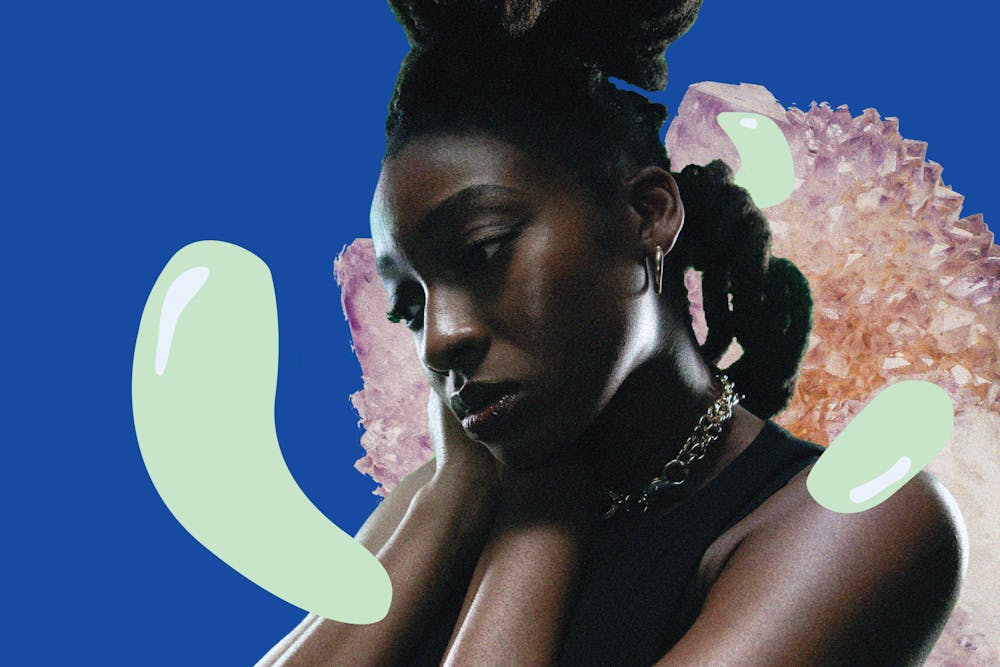To dedicated fans of Little Simz, the title of her fourth studio album might come as a surprise. Simz’s third album, the Mercury Prize–nominated GREY Area, brought mainstream attention to the London–based rapper; her unswerving, no–frills flow distinguished her as a promising and confident lyricist. By exploring personal themes such as the tumultuous time of Simz’s 20s, GREY Area exhibited an artist in the midst of finding herself. On Sometimes I Might Be Introvert, Simz reveals another part of her intricate self by further inspecting her vulnerability. The result is a monumental record that will undeniably be remembered for years to come.
On the opening track “Introvert,” Simz sounds like her GREY Area self. Lush strings and striking bass bolster her defiance and fearlessness. Even when the instrumental simmers down to just a piano, Simz never loses her footing when she talks about balancing two different characters at odds with each other. This dynamic creates an everlasting battle in her life, causing her to find too many differences between “Simz the artist or Simbi the person.”
She even struggles to put up an honest facade, sometimes “smiling” when she’s around other people but “really hurting” when she’s alone. Although Simz sounds the same as she has in her past work, she’s much more mature in her self–reflections. She explicitly defines more of the profound struggles that define her as an introvert, including being “wordless” on “one day” but a “wordsmith” the next. When she’s expected to “have this extroverted persona all the time” in the rap industry, she finds it challenging to support opposing identities.
The ending of “Introvert” features Emma Corrin, an actress who appeared on the Netflix series The Crown. Corrin appears on most of the album’s interludes, but her spoken word outro on “Introvert” is particularly important for characterizing the current state of Simz’s complex personality. She directly references the introversion and how it “led” Simz to be in this disorienting position, almost like she’s talking to Simz herself.
However, Corrin also celebrates what Simz’s introversion has to offer, including feelings that are “well balanced” and truths that are “unveiled with time.” These qualities take Simz on “a journey,” and what follows on the rest of Sometimes I Might Be Introvert is an appreciation of that introversion. The other interludes offer similar pep talks, from calls to “follow the arrow” and “find your calling” on “Gems” or “[reach] for the stars” on “The Rapper that Came to Tea.” At times, these interludes can sound Disney–esque with their luxurious, cinematic sounds, but they perfectly fit Simz’s path as she recognizes her introversion and its originally unforeseen benefits.
The internal dialogues Simz experiences can also be traced back to earlier in her life. On “I Love You, I Hate You,” Simz discusses her turbulent relationship with her father. Feeling mistreated by the unfulfilled vows he made, she questions the purpose of false promises “to God to be there for [his] kids” and “to give them a life [he] didn’t live.” However, now that Simz is older, she’s aware of the more pressing challenges that he faced. She sees “how fickle life can be” and while she thinks her father gave her her “first heartbreak,” she believes these mistakes “contribute to [her] growth.” Now that Simz is at a new stage of her life, she’s more forgiving and willing to move on from moments left in the past. In an interview with NME, Simz mentions how her approach would have been completely different if she’d “written this song two or three years ago,” further signifying the catharsis of self–acceptance.
Besides diving deeper into her life through the lyrics, Simz isn’t afraid to push the sonic boundaries on the album either. “Rollin Stone” is inspired by the latest mainstream trap trends, but the track is elevated by Simz’s vocal flares and modifications. Her voice becomes almost emotionless after it’s reverbed and autotuned, which represents Simz’s transition from happy times “in Sao Paulo / eatin’ palm hearts” to “an illusion” where nothing is “picture perfect” there. This distinct tone acts like another one of Simz’s personas—or an “evil twin” as she describes it. She continues the embrace of her introversion on “Protect My Energy,” Simz’s contribution to the disco revival of the 2020s. Although Simz concedes that she “got problems,” she knows she’s not “f*ckin’ weak” because to her, “total silence” is her “therapy.” Simz chooses to trust her “internal guidance” the most rather than seek “sympathy” from others.
It’s too early to say if Sometimes I Might Be Introvert will be seen as highly as My Beautiful Dark Twisted Fantasy and The Miseducation of Lauryn Hill, or more recently acclaimed albums like IGOR and To Pimp a Butterfly—but Simz has solidified her position as one of the top hip hop artists to watch. She’s constantly evolving as a person, finding power from her introversion rather than seeing it as a flaw. The letters of the album title spells out her name Simbi, short for her birth name Simbiatu, because being an introvert is now a part of her identity. Her most dynamic and impressive album to date comes from times when she’s just by herself.







